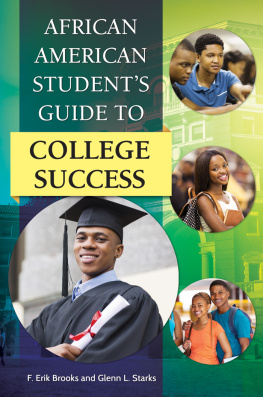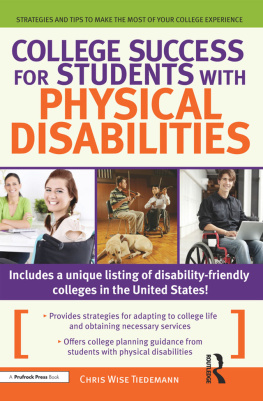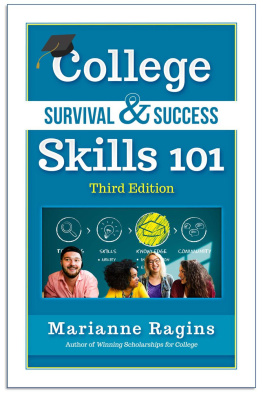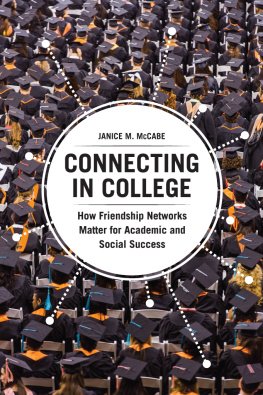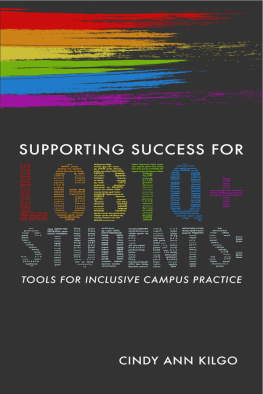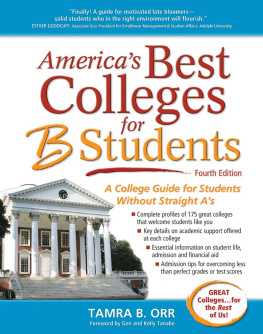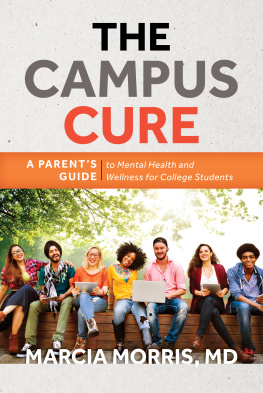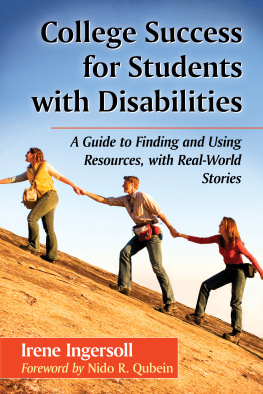African American
Students Guide to
College Success
F. Erik Brooks and Glenn L. Starks

Copyright 2015 by ABC-CLIO, LLC
All rights reserved. No part of this publication may be reproduced, stored in a retrieval system, or transmitted, in any form or by any means, electronic, mechanical, photocopying, recording, or otherwise, except for the inclusion of brief quotations in a review, without prior permission in writing from the publisher.
Library of Congress Cataloging-in-Publication Data
Brooks, F. Erik.
African American students guide to college success / F. Erik Brooks and Glenn L. Starks.
pages cm
Includes bibliographical references and index.
ISBN 9781440829291 (cloth : alk. paper) ISBN 9781440829307 (ebook) 1. African American college studentsLife skills guides. 2. College studentsUnited StatesLife skills guides. 3. College student orientationUnited States. 4. African American college studentsBiography. I. Starks, Glenn L., 1966 II. Title.
LC2781.7.B752015
378.1982996073dc232015022033
ISBN: 9781440829291
EISBN: 9781440829307
19 18 17 16 15 1 2 3 4 5
This book is also available on the World Wide Web as an eBook.
Visit www.abc-clio.com for details.
Greenwood
An Imprint of ABC-CLIO, LLC
ABC-CLIO, LLC
130 Cremona Drive, P.O. Box 1911
Santa Barbara, California 93116-1911
This book is printed on acid-free paper 
Manufactured in the United States of America
Contents
Introduction
For most of the 19th and 20th centuries, African Americans were denied the right to pursue higher education. In the United States, graduating from college has traditionally been the means of obtaining a better way of life. African Americans have not always been afforded the opportunity to attend college. Because of the history of slavery and the practice of racial discrimination in the United States, African Americans have looked to higher education as a way of being competitive for jobs, earning higher wages, and providing for their families. Young people in all socioeconomic groups aspire to seek a college degree. African Americans and first-generation college students are underrepresented on many college campuses. When many attend college, they find it frustrating because of the lack of guidance and the lack of knowledge of the ins and outs of higher education and college life. This book has been designed to help these students find success in college. As African Americans and former first-generation college students, we hope this book can serve as a guide to answer all of the questions that we had when we enrolled at our undergraduate colleges. The prevailing question facing those deliberating if they should attend college is Why should anyone attend college? To start with, college allows students to meet people from varies races, ethnic groups, and cultures. It allows them to explore new opportunities, interests, and experiences. Most importantly, many college graduates earn more money than those with only a high school diploma. Most good jobs require a college education, not only a high school diploma. Public and private industries want to hire people who are able to think and solve complex problems. Pursuing a college degree exposes students to this complex problem solving. People with associate degrees earn more than those with high school diplomas, and people with bachelors degrees earn more than both. A great return on an investment comes from earning associate and/or bachelors degrees, whereas wages for most high school graduates remain stagnate. The Bureau of Labor Statistics (2014) revealed that those with at least a bachelors degree earn a median weekly income of $1,066. This is compared to $652 for those with only a high school diploma and only $471 for those without a high school diploma. As ones level of education increases, so does their income. Those with a masters degree earn $1,300, those with a doctorate $1,624, and those with a professional degree $1,735. The same trend applies to unemployment, which ranges from 12.4 percent for those without a high school diploma, to 4.5 percent for those with a bachelors degree, to 2.1 percent for those with a professional degree.
The authors of this book are both first-generation college students who have earned doctoral degrees. We, along with other colleagues, have discussed our experiences and discovered that there are things we wished that we had known before enrolling into college that may have enriched our undergraduate experience at our prospective undergraduate institutions. This book is an attempt to encapsulate some of these conversations to assist African American high school and college students in gaining a better understanding of the factors they should consider when deciding what university they will attend.
Attending college is a major step in transitioning from childhood to adulthood. Some students are excited by the opportunities that await them during their university experience, while others are apprehensive and fearful about this new and exciting adventure. This book also aims to give students a glimpse of what they may experience when they arrive on a university campus. Choosing a college or university is perhaps one of the most important choices one can make in their lifetime. The decision to go to college is a life-changing event in itself, as it can determine not only a persons income for the rest of their life but also other major life decisions. Having a college degree can determine who one will marry, where they will live, ones level of healthiness (because of the ability to obtain good health insurance and live a happy life), and ones ability to adequately take care of their children.
For African Americans, obtaining a college degree is more than simply a choice: it is a necessity. Blacks in the United States suffer disparities in almost every socioeconomic condition. They have the highest percentages of any racial and ethnic group in poverty, unemployment, health disparities, prison, depressed housing conditions, racial discrimination, homes raised by a single parent, and rates of crime. Education is the key to reversing these overall trends. It is not only the cornerstone of living the American Dream but also the key to successfully competing in a global environment.
With so much at stake, for many students, selecting a college can be very stressful. Even with parents, teachers, and counselors assisting them, students understand that the ultimate choice belongs to them to select a school and major they feel comfortable with, will successfully complete, and find success with afterward. For many black students, there may be limited support from parents and school officials. Their parents may not have gone to college, and teachers and counselors may have too many students to provide one-on-one advice. There is also the tendency to focus on a handful of specifically identified students. However, no student should be discouraged.
Many students (particularly black students) do not attend college because of perceived challenges in navigating the higher educational system. The challenge students find include understanding how to navigate the process of applying to colleges and universities, where to find money to pay for their educations, and what skills are needed to successfully complete their programs. The purpose of this book is to provide both a resource and a road map for African American students in preparing, entering, and succeeding in college. It provides information and resources for succeeding not only at the undergraduate level but also in graduate school at the masters and doctorate levels. This book is specifically written to benefit African American students who may face unique challenges getting into college, with the aim of helping them understand some key issues to ensure they succeed. The success stories provided in this book will, for example, provide personal experiences by those who overcame these challenges.
Next page
